2024届高考英语复习 阅读理解 必会单词(二)(共26张PPT)
文档属性
| 名称 | 2024届高考英语复习 阅读理解 必会单词(二)(共26张PPT) |  | |
| 格式 | pptx | ||
| 文件大小 | 390.2KB | ||
| 资源类型 | 教案 | ||
| 版本资源 | 通用版 | ||
| 科目 | 英语 | ||
| 更新时间 | 2024-05-29 19:59:20 | ||
图片预览


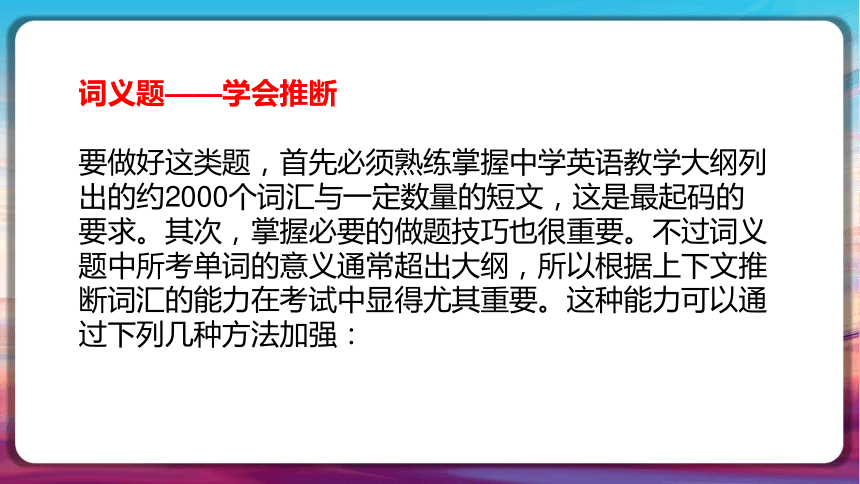
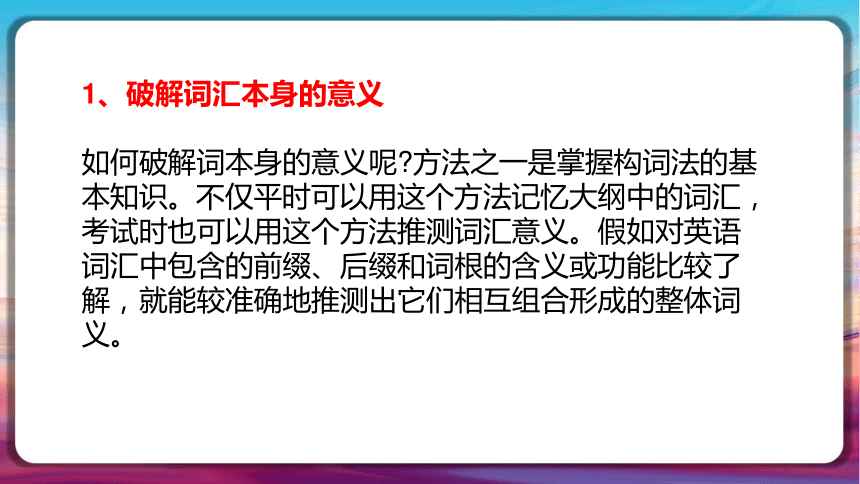

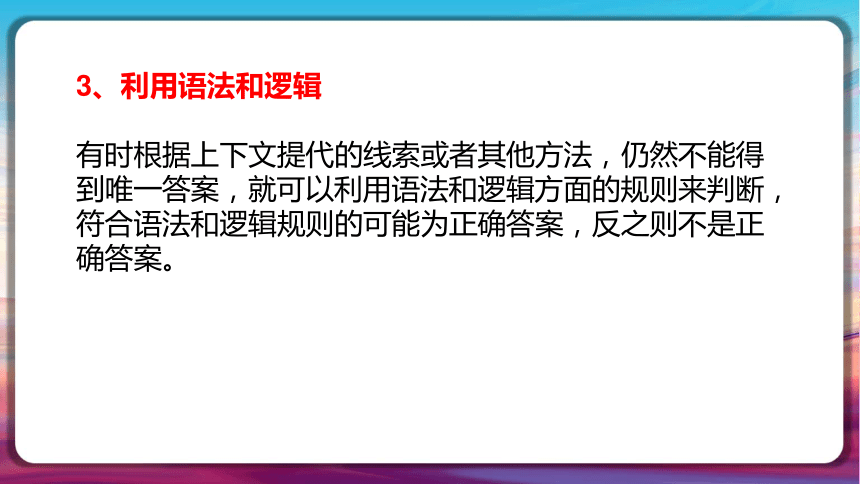
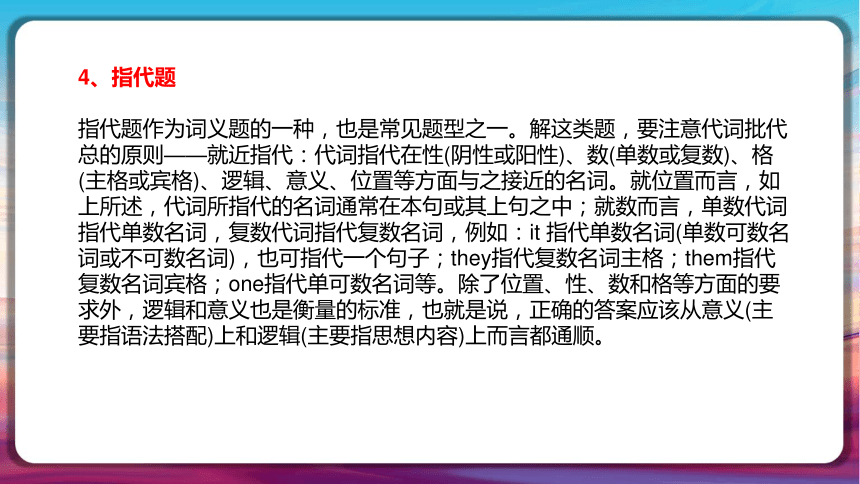

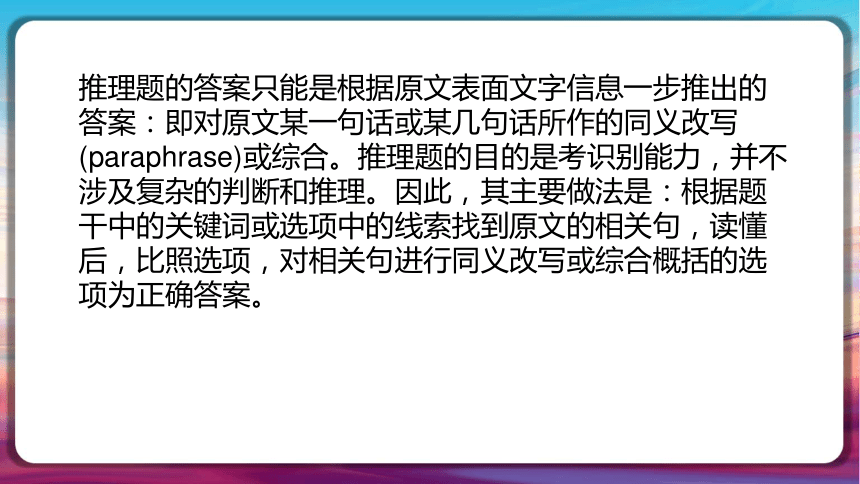
文档简介
(共26张PPT)
高考英语阅读理解
必会单词(二)
知识梳理
01
词义题——学会推断
要做好这类题,首先必须熟练掌握中学英语教学大纲列出的约2000个词汇与一定数量的短文,这是最起码的要求。其次,掌握必要的做题技巧也很重要。不过词义题中所考单词的意义通常超出大纲,所以根据上下文推断词汇的能力在考试中显得尤其重要。这种能力可以通过下列几种方法加强:
1、破解词汇本身的意义
如何破解词本身的意义呢 方法之一是掌握构词法的基本知识。不仅平时可以用这个方法记忆大纲中的词汇,考试时也可以用这个方法推测词汇意义。假如对英语词汇中包含的前缀、后缀和词根的含义或功能比较了解,就能较准确地推测出它们相互组合形成的整体词义。
2、利用一下文线索
除了以构词法破解词汇的意义以外,做词义题用得更多的方法是根据上下文所提供的线索词义。这里的上下文指该词所在的句子本身,也包括这个句子的上下句或更远的上下文。一般而言,上下文线索所提示的意义与所考词汇的关系要么为同义关系,要么为反义关系。假如二者为同义关系,那么所考词汇的意思就是线索提示词的意思;假如二者为反义关系,所考词汇的意思就是线索提示词的反义。
3、利用语法和逻辑
有时根据上下文提代的线索或者其他方法,仍然不能得到唯一答案,就可以利用语法和逻辑方面的规则来判断,符合语法和逻辑规则的可能为正确答案,反之则不是正确答案。
4、指代题
指代题作为词义题的一种,也是常见题型之一。解这类题,要注意代词批代总的原则——就近指代:代词指代在性(阴性或阳性)、数(单数或复数)、格(主格或宾格)、逻辑、意义、位置等方面与之接近的名词。就位置而言,如上所述,代词所指代的名词通常在本句或其上句之中;就数而言,单数代词指代单数名词,复数代词指代复数名词,例如:it 指代单数名词(单数可数名词或不可数名词),也可指代一个句子;they指代复数名词主格;them指代复数名词宾格;one指代单可数名词等。除了位置、性、数和格等方面的要求外,逻辑和意义也是衡量的标准,也就是说,正确的答案应该从意义(主要指语法搭配)上和逻辑(主要指思想内容)上而言都通顺。
推理题——考识别能力
推理题要求在理解原文表面文字信息的基础上,作出一定判断和推论,从而得到文章的隐含意义和深层意义。推理题所涉及的内容可能是文中某一句话,也可是某几句话,但做题的指导思想都是以文字信息为依据,既不能做出在原文中找不到文字根据的推理,也不能根据表面文字信息做多步推理。
推理题的答案只能是根据原文表面文字信息一步推出的答案:即对原文某一句话或某几句话所作的同义改写(paraphrase)或综合。推理题的目的是考识别能力,并不涉及复杂的判断和推理。因此,其主要做法是:根据题干中的关键词或选项中的线索找到原文的相关句,读懂后,比照选项,对相关句进行同义改写或综合概括的选项为正确答案。
做题时要注意题干的语言形式,如According to the passage,——It can be inferred from the passage that——;It can be concluded from the passage that——等,虽然从表面上看是问有关全文的题,但实际上不用看全篇,仍然只需要根据选项中的线索找到原文中与之相关的一句话或几句话,然后得出答案。针对推理题的不同形式,可以采取以下做法:
1.假如题干中有具体线索,根据具体线索找到原文相关句(一句或几句话),然后做出推理;
2.假如题干中无线索,如It can be inferred from the passage that——;It can be concluded from the passage that——等,先扫一下4个选项,排除不太可能的选项,然后根据最可能的选项中的关键词找到原文相关句,做出推理;
3.如果一篇文章中其他题都未涉及文章主旨,那么推理题,如infer, conclude题型,可能与文章主旨有关,考生应该定位到文章主题所在位置(如主题句出现处);假如其他题已经涉及文章主旨,那么要求推断出来的内容可能与段落主题有关,如果如此,应该找段落主题所在处;如果不与段落主题有关,有时与全文或段落的重要结论有关,这时可以寻找与这些结论相关的原文叙述。
阅读理解必备词汇:
recommend vt.推荐
recover vt.恢复,痊愈
recycle vt.重复利用
reduce vt.减少,减小
refer vt.求助于vi.谈到;参考,查阅
reflect vt.反射,反映;思考
reform n.改革,改良vt.改革,革新
register vt.登记,注册n.登记,注册
regular adj.规则的,整齐的;定期的,常规的
tight adj.紧的;紧身的ad.紧紧地
timetable n.时间表;时刻表
tin n.锡;罐头
tip vt.轻击vi.给小费n.小费
tire vi.疲劳;厌倦n.轮胎
title n.标题,题目;称号,头衔
tobacco n.烟草,烟叶
tolerate vt.忍受,容忍
nail n.钉子;指甲vt.钉
nation n.民族,国家
nationality n.国籍,民族
native adj.本土的n.本地人
navy n.海军
neat adj.整洁的;简洁的
needle n.针vt.缝补,编织
nephew n.侄子,外甥
nest n.巢,窝
reject vt.拒绝;丢掉;驳回
relate vt.联系
relative adj.有关系的;相对的n.亲戚,亲属
relevant adj.有关的;中肯的
reliable adj.可靠的
religion n.宗教信仰
rely vi.依赖,依靠;信赖
remark vi.评论n.评论;备注
remind vt.提醒
remote adj.遥远的
阅读理解必备词汇:
teenager n.青少年
telegram n.电报
telegraph n.电报(机) v.发电报
telescope n.望远镜
television n.电视,电视机
temple n.神殿,庙宇;太阳穴
temporary adj.暂时的,临时的
tend vi.走向,趋向
tendency n.趋向,趋势
sacrifice vt.牺牲,献祭
sailor n.海员,水兵
salary n.薪水
satellite n.卫星
satisfaction n.满意
scan vt.浏览;扫描
scare vt.惊吓vi.受惊
scene n.情景;景色
schedule vt.安排n.时间表,计划表
scholarship n.奖学金
scientific adj.科学的
scold vt.责骂
scream vi.尖叫n.尖叫声
seaside n.海边
section n.切片;部门;章节
secure adj.安全的
seed n.种(子),籽
seek vt.寻找,探索
seize vt.抓住;夺取,占据
select vt.选择vi.挑选
self n.自我,自己
selfish adj.自私的,利己的
senior adj.年长者;资格老的
sensitive adj.敏感的,灵敏的
settle vt.安排,安放;解决vi.定居
sew vt.缝制
sex n.性别,性
shade n.树荫;遮光物vi.荫蔽
shadow n.阴影,影子
模拟练习
02
The human brain remembers negative experiences more easily than positive ones. Our brains have developed this way because threats, like dangerous animals, had a more immediate effect on our ancestors’ survival compared to positive things like food or shelter. As a result, you likely know what makes you unhappy, but do you know what makes you happy
Research suggests that our level of happiness depends partly on factors we cannot control—our genes and our life circumstances. But our level of happiness is also shaped by the choices we make. If you’ve been chasing wealth, fame, good looks, material things and power, you may be looking for happiness in all the wrong places. Psychologists suggest that the following habits make people happier.
People who form close relationships tend to be happier than those who do not. The number of friends we have is not important, What matters is the quality of our relationships. Relationships that bring happiness usually involve the sharing of feelings, mutual respect, acceptance, trust and fun.
People who exercise regularly improve both their physical and mental well being. Some research has shown that exercise can be as effective as medication in treating depression,
When we are so interested in an activity we enjoy that we lose track of time, we are in a state of flow. The activity could be making art, playing piano, surfing, or playing a game. People who experience flow in their work or hobbies tend to be happier,
People are more likely to be happy if they know what their strengths are and use them regularly, People who set goals and use their strengths to achieve them tend to be happier. People are especially happy when they can use their strengths to serve the greater good.
People who think positively by being grateful, mindful and optimistic are more likely to be happy. Being grateful means being thankful, Being mindful means being open to, focusing on and enjoying the experiences of the present moment. Being optimistic means being hopeful about the future.
12. Why does the human brain remember negative things more easily
A. Negative things are easy to remember.
B. Dangerous wild animals are a threat to us,
C. Our ancestors had no enough food for living.
D. Negative things tend to affect human survival immediately,
13. How does the author like looking for happiness in material things
A. Uncertain.
B. Opposed,
C. Supportive.
D. Optimistic.
14. What does the author suggest us in the last paragraph
A. Enjoying our life and work.
B. Leading a happy life each day.
C. Being positive in our life and work.
D. Thinking more about the future.
15. What does this text mainly tell us
A. The factors that make people happy.
B. How to remember positive things easily,
C. The habits which people form in their life.
D. Why people remember negative things easily.
【答案】12. D 13. B 14. C 15. A
【解析】真正能使我们快乐的并不是物质的东西,作者在文中介绍了几种会让人更快乐的习惯。
12. D
细节推理题。根据第一段Our brains have developed this way because threats, like dangerous animals, had a more immediate effect on our ancestors’ survival compared to positive things like food or shelter.可知负面的东西相对于积极的东西对我们祖先的生存有更直接的影响,所以更容易被记住。故选D.
13. B
推理判断题。根据第二段If you’ve been chasing wealth, fame, good looks, material things and power, you may be looking for happiness in all the wrong places. 一直追求财富、名誉、美貌、物质和权力,你可能会在所有错误的地方寻找幸福。由此可见作者对寻找物质上的幸福持反对态度,故选B.
14. C
推理判断题。最后一段People who think positively by being grateful, mindful and optimistic are more likely to be happy.积极乐观的人感恩,专注,乐观,更容易快乐。以及下文几者之间的内在关系可知作者建议我们在生活和工作中要积极乐观,故选C.
15. A
主旨大意题。作者在文中介绍了几种会让人更快乐的习惯,如建立亲密关系,锻炼,了解自己的优点,感恩,专注,乐观积极的生活态度等。即使人快乐的因素,故选A.
thanks
高考英语阅读理解
必会单词(二)
知识梳理
01
词义题——学会推断
要做好这类题,首先必须熟练掌握中学英语教学大纲列出的约2000个词汇与一定数量的短文,这是最起码的要求。其次,掌握必要的做题技巧也很重要。不过词义题中所考单词的意义通常超出大纲,所以根据上下文推断词汇的能力在考试中显得尤其重要。这种能力可以通过下列几种方法加强:
1、破解词汇本身的意义
如何破解词本身的意义呢 方法之一是掌握构词法的基本知识。不仅平时可以用这个方法记忆大纲中的词汇,考试时也可以用这个方法推测词汇意义。假如对英语词汇中包含的前缀、后缀和词根的含义或功能比较了解,就能较准确地推测出它们相互组合形成的整体词义。
2、利用一下文线索
除了以构词法破解词汇的意义以外,做词义题用得更多的方法是根据上下文所提供的线索词义。这里的上下文指该词所在的句子本身,也包括这个句子的上下句或更远的上下文。一般而言,上下文线索所提示的意义与所考词汇的关系要么为同义关系,要么为反义关系。假如二者为同义关系,那么所考词汇的意思就是线索提示词的意思;假如二者为反义关系,所考词汇的意思就是线索提示词的反义。
3、利用语法和逻辑
有时根据上下文提代的线索或者其他方法,仍然不能得到唯一答案,就可以利用语法和逻辑方面的规则来判断,符合语法和逻辑规则的可能为正确答案,反之则不是正确答案。
4、指代题
指代题作为词义题的一种,也是常见题型之一。解这类题,要注意代词批代总的原则——就近指代:代词指代在性(阴性或阳性)、数(单数或复数)、格(主格或宾格)、逻辑、意义、位置等方面与之接近的名词。就位置而言,如上所述,代词所指代的名词通常在本句或其上句之中;就数而言,单数代词指代单数名词,复数代词指代复数名词,例如:it 指代单数名词(单数可数名词或不可数名词),也可指代一个句子;they指代复数名词主格;them指代复数名词宾格;one指代单可数名词等。除了位置、性、数和格等方面的要求外,逻辑和意义也是衡量的标准,也就是说,正确的答案应该从意义(主要指语法搭配)上和逻辑(主要指思想内容)上而言都通顺。
推理题——考识别能力
推理题要求在理解原文表面文字信息的基础上,作出一定判断和推论,从而得到文章的隐含意义和深层意义。推理题所涉及的内容可能是文中某一句话,也可是某几句话,但做题的指导思想都是以文字信息为依据,既不能做出在原文中找不到文字根据的推理,也不能根据表面文字信息做多步推理。
推理题的答案只能是根据原文表面文字信息一步推出的答案:即对原文某一句话或某几句话所作的同义改写(paraphrase)或综合。推理题的目的是考识别能力,并不涉及复杂的判断和推理。因此,其主要做法是:根据题干中的关键词或选项中的线索找到原文的相关句,读懂后,比照选项,对相关句进行同义改写或综合概括的选项为正确答案。
做题时要注意题干的语言形式,如According to the passage,——It can be inferred from the passage that——;It can be concluded from the passage that——等,虽然从表面上看是问有关全文的题,但实际上不用看全篇,仍然只需要根据选项中的线索找到原文中与之相关的一句话或几句话,然后得出答案。针对推理题的不同形式,可以采取以下做法:
1.假如题干中有具体线索,根据具体线索找到原文相关句(一句或几句话),然后做出推理;
2.假如题干中无线索,如It can be inferred from the passage that——;It can be concluded from the passage that——等,先扫一下4个选项,排除不太可能的选项,然后根据最可能的选项中的关键词找到原文相关句,做出推理;
3.如果一篇文章中其他题都未涉及文章主旨,那么推理题,如infer, conclude题型,可能与文章主旨有关,考生应该定位到文章主题所在位置(如主题句出现处);假如其他题已经涉及文章主旨,那么要求推断出来的内容可能与段落主题有关,如果如此,应该找段落主题所在处;如果不与段落主题有关,有时与全文或段落的重要结论有关,这时可以寻找与这些结论相关的原文叙述。
阅读理解必备词汇:
recommend vt.推荐
recover vt.恢复,痊愈
recycle vt.重复利用
reduce vt.减少,减小
refer vt.求助于vi.谈到;参考,查阅
reflect vt.反射,反映;思考
reform n.改革,改良vt.改革,革新
register vt.登记,注册n.登记,注册
regular adj.规则的,整齐的;定期的,常规的
tight adj.紧的;紧身的ad.紧紧地
timetable n.时间表;时刻表
tin n.锡;罐头
tip vt.轻击vi.给小费n.小费
tire vi.疲劳;厌倦n.轮胎
title n.标题,题目;称号,头衔
tobacco n.烟草,烟叶
tolerate vt.忍受,容忍
nail n.钉子;指甲vt.钉
nation n.民族,国家
nationality n.国籍,民族
native adj.本土的n.本地人
navy n.海军
neat adj.整洁的;简洁的
needle n.针vt.缝补,编织
nephew n.侄子,外甥
nest n.巢,窝
reject vt.拒绝;丢掉;驳回
relate vt.联系
relative adj.有关系的;相对的n.亲戚,亲属
relevant adj.有关的;中肯的
reliable adj.可靠的
religion n.宗教信仰
rely vi.依赖,依靠;信赖
remark vi.评论n.评论;备注
remind vt.提醒
remote adj.遥远的
阅读理解必备词汇:
teenager n.青少年
telegram n.电报
telegraph n.电报(机) v.发电报
telescope n.望远镜
television n.电视,电视机
temple n.神殿,庙宇;太阳穴
temporary adj.暂时的,临时的
tend vi.走向,趋向
tendency n.趋向,趋势
sacrifice vt.牺牲,献祭
sailor n.海员,水兵
salary n.薪水
satellite n.卫星
satisfaction n.满意
scan vt.浏览;扫描
scare vt.惊吓vi.受惊
scene n.情景;景色
schedule vt.安排n.时间表,计划表
scholarship n.奖学金
scientific adj.科学的
scold vt.责骂
scream vi.尖叫n.尖叫声
seaside n.海边
section n.切片;部门;章节
secure adj.安全的
seed n.种(子),籽
seek vt.寻找,探索
seize vt.抓住;夺取,占据
select vt.选择vi.挑选
self n.自我,自己
selfish adj.自私的,利己的
senior adj.年长者;资格老的
sensitive adj.敏感的,灵敏的
settle vt.安排,安放;解决vi.定居
sew vt.缝制
sex n.性别,性
shade n.树荫;遮光物vi.荫蔽
shadow n.阴影,影子
模拟练习
02
The human brain remembers negative experiences more easily than positive ones. Our brains have developed this way because threats, like dangerous animals, had a more immediate effect on our ancestors’ survival compared to positive things like food or shelter. As a result, you likely know what makes you unhappy, but do you know what makes you happy
Research suggests that our level of happiness depends partly on factors we cannot control—our genes and our life circumstances. But our level of happiness is also shaped by the choices we make. If you’ve been chasing wealth, fame, good looks, material things and power, you may be looking for happiness in all the wrong places. Psychologists suggest that the following habits make people happier.
People who form close relationships tend to be happier than those who do not. The number of friends we have is not important, What matters is the quality of our relationships. Relationships that bring happiness usually involve the sharing of feelings, mutual respect, acceptance, trust and fun.
People who exercise regularly improve both their physical and mental well being. Some research has shown that exercise can be as effective as medication in treating depression,
When we are so interested in an activity we enjoy that we lose track of time, we are in a state of flow. The activity could be making art, playing piano, surfing, or playing a game. People who experience flow in their work or hobbies tend to be happier,
People are more likely to be happy if they know what their strengths are and use them regularly, People who set goals and use their strengths to achieve them tend to be happier. People are especially happy when they can use their strengths to serve the greater good.
People who think positively by being grateful, mindful and optimistic are more likely to be happy. Being grateful means being thankful, Being mindful means being open to, focusing on and enjoying the experiences of the present moment. Being optimistic means being hopeful about the future.
12. Why does the human brain remember negative things more easily
A. Negative things are easy to remember.
B. Dangerous wild animals are a threat to us,
C. Our ancestors had no enough food for living.
D. Negative things tend to affect human survival immediately,
13. How does the author like looking for happiness in material things
A. Uncertain.
B. Opposed,
C. Supportive.
D. Optimistic.
14. What does the author suggest us in the last paragraph
A. Enjoying our life and work.
B. Leading a happy life each day.
C. Being positive in our life and work.
D. Thinking more about the future.
15. What does this text mainly tell us
A. The factors that make people happy.
B. How to remember positive things easily,
C. The habits which people form in their life.
D. Why people remember negative things easily.
【答案】12. D 13. B 14. C 15. A
【解析】真正能使我们快乐的并不是物质的东西,作者在文中介绍了几种会让人更快乐的习惯。
12. D
细节推理题。根据第一段Our brains have developed this way because threats, like dangerous animals, had a more immediate effect on our ancestors’ survival compared to positive things like food or shelter.可知负面的东西相对于积极的东西对我们祖先的生存有更直接的影响,所以更容易被记住。故选D.
13. B
推理判断题。根据第二段If you’ve been chasing wealth, fame, good looks, material things and power, you may be looking for happiness in all the wrong places. 一直追求财富、名誉、美貌、物质和权力,你可能会在所有错误的地方寻找幸福。由此可见作者对寻找物质上的幸福持反对态度,故选B.
14. C
推理判断题。最后一段People who think positively by being grateful, mindful and optimistic are more likely to be happy.积极乐观的人感恩,专注,乐观,更容易快乐。以及下文几者之间的内在关系可知作者建议我们在生活和工作中要积极乐观,故选C.
15. A
主旨大意题。作者在文中介绍了几种会让人更快乐的习惯,如建立亲密关系,锻炼,了解自己的优点,感恩,专注,乐观积极的生活态度等。即使人快乐的因素,故选A.
thanks
